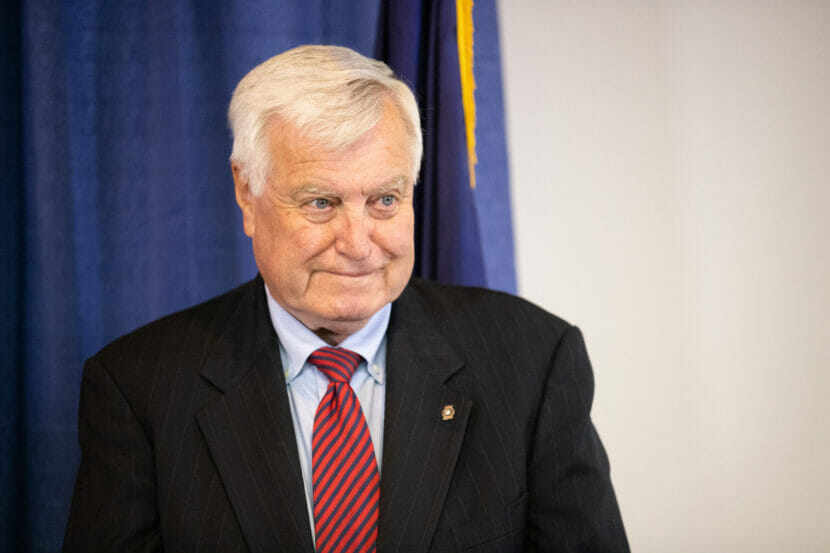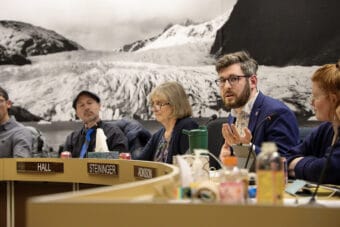
At the center of several controversies swirling around the administration of Anchorage Mayor Dave Bronson is the mayor’s closest advisor, Larry Baker.
According to a recent story in the Anchorage Daily News, Baker was a key figure in shutting down plans for a long-sought drug and alcohol treatment center, and Baker is accused of trying to meddle with the criminal prosecution of one of his close business associates.
ADN reporter Emily Goodykoontz has been reporting on what has now evolved into several investigations of the Bronson administration. And Goodykoontz says the story of Larry Baker’s involvement with the treatment center starts with the former administration’s plans to locate the center in the former Golden Lion Hotel.
Listen:
Emily Goodykoontz: So the city buys this building, and then enters the campaign of Mayor Dave Bronson. And he really capitalized on a lot of sentiment in the community, and especially in the Geneva Woods area, which is right next to the Golden Lion. And they really did not want a treatment center there. There were a lot of concerns about how it would impact the neighborhood. Bronson was, you know, one of the people who spoke out against that plan. So he comes in and campaigns and he says, “This, this is never happening. You know, if I’m mayor, I’m going to sell this building.”
Casey Grove: So Dave Bronson comes into office and seems to have sort of killed that idea of turning the Golden Lion into a treatment center. And there’s a couple of different aspects to that, or it seems like a couple of different ways that that happened. And one involves his most trusted adviser, Larry Baker, who just happens to live practically next door to the Golden Lion, right? So maybe we should back up first and just talk about who Larry Baker is. So I guess that’s the question, who is Larry Baker anyway?
Emily Goodykoontz: OK, Larry Baker has been around a long time. He’s a longtime Alaska businessman. He started the first Burger King franchises in Alaska. And he is also a former assemblyman. He served for a time a short time in the Legislature. City Hall employees say he’s Bronson’s most trusted advisor and friend there. They talk every day, they’re very close, and he really relies on Baker to help him navigate the world of municipal politics, because Bronson had never held elected office in Anchorage before.
Casey Grove: And so there have been various things that point to Larry Baker, in regards to some of the controversies that have arisen with the Bronson administration. And right now we’re just focusing on this Golden Lion issue. And I definitely would, you know, urge folks to head to adn.com and read your story about all of this that you wrote with Kyle Hopkins, that gets into a lot more. But in regards to the Golden Lion deal, what did folks say about how Larry Baker reacted to this idea of that being a treatment center, and I guess more specifically, what he might have done to help kill that idea?
Emily Goodykoontz: The former real estate director who was fired pretty early on into the Bronson administration, Christina Hendrickson, talks about this instance, in which she and the (Maintenance and Operations) director, Saxton Shearer, tour the facility. They tour the Golden Lion, and they think, “Oh my gosh, this place is perfect. This would be the perfect solution.” So they’re really jazzed up about this. That’s how Christina Hendrickson describes this. But then Saxton, in a meeting for a different purpose with Larry Baker mentions this to him. And as Christina describes it, Baker just kind of flies off the handle and says, “Absolutely not. This is a campaign promise. No. We’re done with this.”
Casey Grove: And so he clearly played a role in what has now led to that building basically just sitting vacant at this point. But then there was also a little bit of a discrepancy about a letter from the DOT about some highway reconstruction plans, right? So that’s another part of this controversy that involves the mayor. So tell me about that. What was the deal with the letter from the Department of Transportation?
Emily Goodykoontz: This is a really interesting development. In August, the Bronson administration arranges a sit-down with one of the top officials in the Department of Transportation in Larry Baker’s office to discuss this highway project. The state has been planning for a long time to improve the interchange on the Seward Highway and 36th Avenue right there. After that, the director writes a letter that included a key sentence that Bronson then used to justify denying the treatment center project. And he immediately sends this letter to the Assembly and then later proposes the city condemn the building, which the Assembly did not do.
Casey Grove: This is a letter from the regional director for the Department of Transportation, the state DOT, that he is now saying the mayor maybe, quote unquote, “dishonestly” used, saying a bunch of the parking spots from this hotel, former hotel, would be eliminated by this highway project. And that had been changed, to the mayor saying this would result in the entire hotel needing to be demolished, right?
Emily Goodykoontz: Right. And, you know, really what that letter meant, and this is according to the director, is that because of the municipality’s rules around what you have to have in terms of parking for a hotel, it would no longer be viable as a hotel under those rules.
Casey Grove: So there are other investigations going on related to the former health director, Joe Gerace. Maybe a couple other investigations the ombudsman is conducting. You spoke with the ombudsman, Darrel Hess. Where do we go from here?
Emily Goodykoontz: I think a lot of people working in city government are trying to figure that out right now. We’ve seen this outpouring of hostile work environment accusations coming out of City Hall. And the ombudsman, while we were on the phone, he actually received an email with another hostile work environment claim from a municipal employee.


